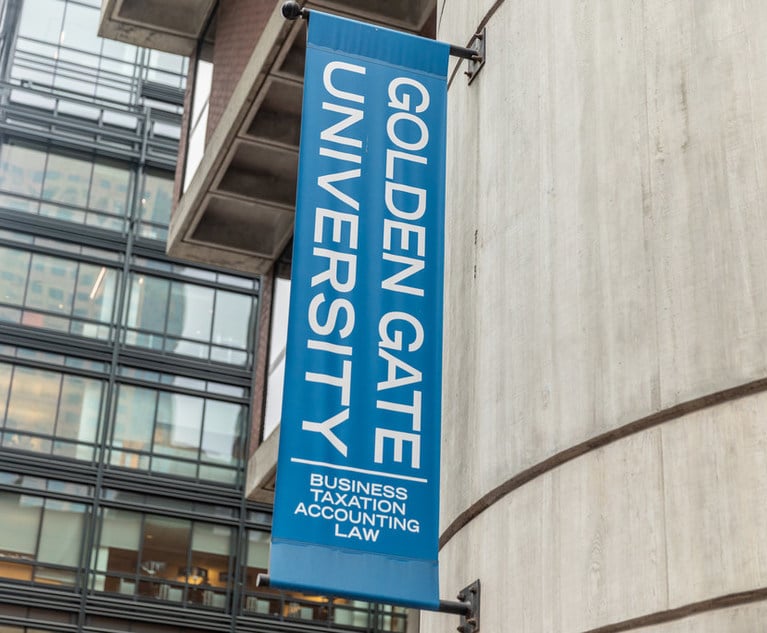Judge to Consider Whether to Unseal Vast Surveillance Records
U.S. Magistrate Judge Kandis Westmore of the Northern District of California may reveal whether the curtain of secrecy around past electronic surveillance in criminal investigations will be pulled back.
May 01, 2018 at 06:58 PM
4 minute read

Editor's Note: After deadline, the hearing in this case was moved from Thursday, May 3 to August 16. The story has been updated to reflect the change.
The highly publicized debate over whether a federal court could compel Apple to break the security features of the iPhone at the behest of the FBI was a rare moment in history. Most of the time, the public never has a clue when authorities come knocking to ask a company for help in accessing the digital communications of a criminal suspect.
But in August, we may learn more about whether the curtain of secrecy around past electronic surveillance in criminal investigations will be pulled back.
U.S. Magistrate Judge Kandis Westmore of the Northern District of California will hear from local prosecutors and two legal activists, Jennifer Granick of the American Civil Liberties Union and Riana Pfefferkorn of the Stanford Center for Internet and Society, over whether she should set up a process to determine which cases are still validly sealed and those that can be opened.
Granick and Pfefferkorn petitioned the court to unseal cases in the Northern District—where Apple, Google and other giants of Silicon Valley are headquartered—in which technical assistance was sought by authorities, from 2006 until the 6 months prior to the court making a decision. Doing so would surely be a massive administrative undertaking. But the two argue that even if it's hard to do, that doesn't overcome the public's right to know under the law.
“An unintentional by-product of local court practices and federal surveillance statutes is that the surveillance dockets of federal courts around the country typically remain under seal indefinitely, long past any need for secrecy,” Pfefferkorn said this week in an email. “That situation, while inadvertent, contravenes the press and public's rights to access the courts. Our petition aims to correct that,” she added.
Westmore initially denied a motion to unseal surveillance dockets from 2006-2011 in an order last year, calling it overbroad, while at the same time directing prosecutors to evaluate what could be unsealed. The U.S. Attorney's Office indicated that while some prior case files could be unsealed, it was currently only willing do to do so on a case-by-base basis. Granick and Pfefferkorn say that's not a workable solution.
The challenge that they now face now involves a case out of the D.C. district court called In re Leopold, in which a BuzzFeed journalist named Jason Leopold sought to unseal almost 20 years' worth of cases involving digital communications surveillance.
Leopold and the Reporters Committee for Freedom of the Press were able to get a fair amount of data through that lawsuit. But in February, the chief judge of the D.C. district court ruled that giving them everything they asked for would put an “unduly significant” burden on prosecutors and the clerk's office.
“We understand that our request presents a challenge, but we disagree with the Leopold court that the challenges of unsealing are dispositive,” Granick and Pfefferkorn write in their latest brief. They argue that Ninth Circuit law is different than in D.C., and that the Leopold case is distinguishable from their own in terms of the work it would require. At the same time, they say they're open to narrowing their petition to make it feasible.
The local U.S. attorney's office is not exactly enthusiastic about the idea of unlocking years' worth of sealed dockets. It says the office—in cooperation with the court clerk—has already made some prospective changes to make it easier to track and unseal cases in the future.
“The litigation in Leopold teaches that unsealing or docketing of historical matters is an unduly burdensome process,” Assistant U.S. Attorney Kyle Waldinger wrote in a response brief.
Westmore is set to hold a case management conference to hear from both sides—and possibly give her own views—at her courtroom in Oakland on August 16.
Correction: An earlier version of this story misstated the length of time that the petition covers, and inadvertently mischaracterized the judge's decision last year. She denied a motion to unseal, not the petition.
This content has been archived. It is available through our partners, LexisNexis® and Bloomberg Law.
To view this content, please continue to their sites.
Not a Lexis Subscriber?
Subscribe Now
Not a Bloomberg Law Subscriber?
Subscribe Now
NOT FOR REPRINT
© 2025 ALM Global, LLC, All Rights Reserved. Request academic re-use from www.copyright.com. All other uses, submit a request to [email protected]. For more information visit Asset & Logo Licensing.
You Might Like
View All
'Nothing Is Good for the Consumer Right Now': Experts Weigh Benefits, Drawbacks of Updated Real Estate Commission Policies

Federal Judge Denies Build-A-Bear Workshop's Motion to Dismiss 'Squishmallow' Copyright Infringement Suit
Trending Stories
Who Got The Work
J. Brugh Lower of Gibbons has entered an appearance for industrial equipment supplier Devco Corporation in a pending trademark infringement lawsuit. The suit, accusing the defendant of selling knock-off Graco products, was filed Dec. 18 in New Jersey District Court by Rivkin Radler on behalf of Graco Inc. and Graco Minnesota. The case, assigned to U.S. District Judge Zahid N. Quraishi, is 3:24-cv-11294, Graco Inc. et al v. Devco Corporation.
Who Got The Work
Rebecca Maller-Stein and Kent A. Yalowitz of Arnold & Porter Kaye Scholer have entered their appearances for Hanaco Venture Capital and its executives, Lior Prosor and David Frankel, in a pending securities lawsuit. The action, filed on Dec. 24 in New York Southern District Court by Zell, Aron & Co. on behalf of Goldeneye Advisors, accuses the defendants of negligently and fraudulently managing the plaintiff's $1 million investment. The case, assigned to U.S. District Judge Vernon S. Broderick, is 1:24-cv-09918, Goldeneye Advisors, LLC v. Hanaco Venture Capital, Ltd. et al.
Who Got The Work
Attorneys from A&O Shearman has stepped in as defense counsel for Toronto-Dominion Bank and other defendants in a pending securities class action. The suit, filed Dec. 11 in New York Southern District Court by Bleichmar Fonti & Auld, accuses the defendants of concealing the bank's 'pervasive' deficiencies in regards to its compliance with the Bank Secrecy Act and the quality of its anti-money laundering controls. The case, assigned to U.S. District Judge Arun Subramanian, is 1:24-cv-09445, Gonzalez v. The Toronto-Dominion Bank et al.
Who Got The Work
Crown Castle International, a Pennsylvania company providing shared communications infrastructure, has turned to Luke D. Wolf of Gordon Rees Scully Mansukhani to fend off a pending breach-of-contract lawsuit. The court action, filed Nov. 25 in Michigan Eastern District Court by Hooper Hathaway PC on behalf of The Town Residences LLC, accuses Crown Castle of failing to transfer approximately $30,000 in utility payments from T-Mobile in breach of a roof-top lease and assignment agreement. The case, assigned to U.S. District Judge Susan K. Declercq, is 2:24-cv-13131, The Town Residences LLC v. T-Mobile US, Inc. et al.
Who Got The Work
Wilfred P. Coronato and Daniel M. Schwartz of McCarter & English have stepped in as defense counsel to Electrolux Home Products Inc. in a pending product liability lawsuit. The court action, filed Nov. 26 in New York Eastern District Court by Poulos Lopiccolo PC and Nagel Rice LLP on behalf of David Stern, alleges that the defendant's refrigerators’ drawers and shelving repeatedly break and fall apart within months after purchase. The case, assigned to U.S. District Judge Joan M. Azrack, is 2:24-cv-08204, Stern v. Electrolux Home Products, Inc.
Featured Firms
Law Offices of Gary Martin Hays & Associates, P.C.
(470) 294-1674
Law Offices of Mark E. Salomone
(857) 444-6468
Smith & Hassler
(713) 739-1250








